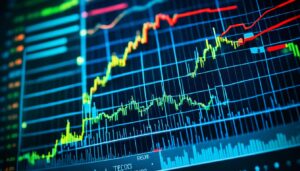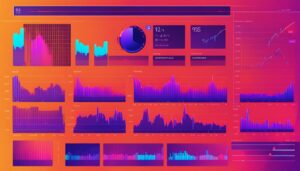Hi there! Today, I want to talk to you about Forex – the exciting world of currency trading. If you’ve ever wondered what Forex is all about, you’ve come to the right place. In this article, I will explain the basics of Forex trading and give you a clear understanding of this global marketplace.
Forex, or foreign exchange, is the process of exchanging one currency for another. It’s a decentralized market where currencies are bought and sold. With a daily global volume of $7.5 trillion, Forex is the largest and most liquid asset market in the world.
Key Takeaways:
- Forex, or foreign exchange, is the process of exchanging one currency for another.
- The Forex market is the largest and most liquid asset market in the world.
- Forex trading involves buying and selling currencies.
- The daily global volume for Forex trading reached $7.5 trillion in 2022.
- Stay tuned to learn more about the Forex market and how it works!
What is the Forex Market?
The forex market, also known as the foreign exchange market, is a decentralized market where currencies are traded electronically over the counter (OTC). Unlike other financial markets, such as stocks or bonds, there is no central exchange for forex trading. Instead, transactions occur between traders worldwide through computer networks.
The forex market operates globally, 24 hours a day, five and a half days a week. It is highly active and constantly changing, with price quotes fluctuating based on supply and demand. As a trader in the forex market, I have the opportunity to buy and sell currencies from different countries at any given time.
Global Accessibility and Liquidity
One of the key advantages of the forex market is its global accessibility. Since it operates around the clock, I can trade forex at any time, regardless of my geographical location. This accessibility allows for continuous market participation and the ability to react quickly to global economic events and news.
The forex market is also known for its high liquidity. With a daily global trading volume of $7.5 trillion, it is the largest and most liquid asset market in the world. This liquidity ensures that I can easily enter and exit positions, even with large trading volumes, without significantly impacting market prices.
Fluctuating Prices and Volatility
The forex market is characterized by its constantly changing prices. Currency exchange rates are influenced by various factors, including economic indicators, geopolitical events, and market sentiment. These factors contribute to the volatility of the forex market, creating opportunities for traders to profit from price movements.
As a trader, I closely monitor market conditions and analyze charts to identify potential trading opportunities. I utilize technical analysis tools and indicators to assist in my decision-making process, helping me to predict and capitalize on price fluctuations.
The forex market provides me with the flexibility to trade on my own terms, allowing me to take advantage of global economic trends and profit from currency exchange rate movements.” – Anonymous Forex Trader
| Key Features of the Forex Market | Benefits |
|---|---|
| Decentralized Market | Allows for direct trading between market participants without the need for a central exchange. |
| Global Accessibility | Enables trading 24 hours a day, five and a half days a week, across different time zones. |
| High Liquidity | Provides the ability to enter and exit positions easily, even with large trading volumes. |
| Volatility | Offers opportunities for profit due to frequent price fluctuations. |
Whether I am a seasoned trader or new to forex trading, understanding the dynamics of the forex market is essential for success. By staying informed and adapting to changing market conditions, I can make informed trading decisions and potentially achieve my financial goals.
How Does Forex Trading Work?
Forex trading involves various markets, each with its own characteristics and trading strategies. These markets include the spot market, forwards market, futures market, and options market.
The Spot Market
In the spot market, currencies are bought and sold based on their current trading price. It is the most straightforward and accessible market for forex trading. Traders can execute transactions instantly to take advantage of prevailing currency exchange rates.
The Forwards Market
In the forwards market, traders enter into contracts to buy or sell currencies at a future date and a predetermined price. These contracts are customized and privately negotiated between parties, allowing for flexibility in terms of contract size and settlement date.
The Futures Market
The futures market, similar to the forwards market, involves the buying and selling of contracts to exchange currencies at a future date and a predetermined price. However, futures contracts are standardized and traded on regulated exchanges. This market provides transparency and liquidity for traders.
The Options Market
The options market deals with contracts that represent claims to a certain currency type at a future date. Traders have the right, but not the obligation, to buy or sell currencies at a predetermined price. Options offer flexibility and allow traders to manage risk by hedging against adverse currency movements.
Each market presents opportunities for traders to engage in forex trading based on their objectives and preferences. Understanding the characteristics and nuances of each market is essential for successful trading.
With a grasp of how forex trading works, let’s explore different strategies and approaches to utilizing the forex markets.
Using the Forex Markets
Forex trading offers numerous opportunities for different purposes. It can be utilized for hedging against international currency and interest rate risks, as well as for speculation to generate profits. Traders employ various strategies and techniques to navigate the forex market successfully.
Hedging with Forex
One of the primary uses of forex trading is hedging. Hedging involves fixing an exchange rate to mitigate potential losses in currency value. This strategy is commonly employed by individuals and businesses involved in international trade and investments. By utilizing forex contracts, traders can secure a specific exchange rate to protect themselves from adverse movements in currency prices.
“Forex enables me to hedge my currency risk and protect my international investments from potential losses. I can lock in exchange rates and minimize the impact of currency fluctuations on my business profits.”
 - Amanda Rodriguez, International Business Owner
Speculation in Forex
Another significant application of forex trading is speculation. Speculators aim to predict price movements and profit from changes in exchange rates. By analyzing market trends, economic indicators, and geopolitical events, traders can identify potential opportunities for profit. Speculation in forex requires a thorough understanding of market dynamics, technical analysis, and risk management.
“I enjoy speculating in the forex market because it offers dynamic opportunities. By closely monitoring economic news and market trends, I can capitalize on short-term price movements and generate profits.”
 - David Thompson, Forex Speculator
Forex Currency Exchange Strategies
Traders can employ various strategies when trading forex. Two commonly used strategies are carry trading and taking advantage of interest rate differentials between currencies. Carry trading involves borrowing in a low-interest-rate currency and investing in a higher-yielding currency to benefit from the interest rate differential. This strategy aims to generate income from the interest rate spread.
Additionally, traders can profit from interest rate differentials by executing currency carry trades. This strategy involves buying a currency with a higher interest rate and selling a currency with a lower interest rate. Traders aim to profit from the interest rate differential as well as potential currency appreciation.
| Forex Strategy | Description |
|---|---|
| Carry Trading | Borrowing in a low-interest-rate currency and investing in a higher-yielding currency to profit from interest rate differentials. |
| Interest Rate Differentials | Capitalizing on interest rate differentials by buying currencies with higher interest rates and selling currencies with lower interest rates. |
Overall, forex trading provides opportunities for both hedging and speculation. Traders can utilize various strategies and techniques to navigate the market and achieve their financial goals. However, it is crucial to understand the risks involved and employ appropriate risk management practices to ensure successful trading.

How to Start Trading Forex
When it comes to entering the exciting world of forex trading, there are a few key steps to get started. Understanding the market and developing a trading strategy are essential components for success in this dynamic industry. Here are some important considerations to keep in mind:
Educate Yourself
Before diving into forex trading, it’s crucial to gain knowledge about the market and its intricacies. Familiarize yourself with the basic concepts and terminology to better understand how the market functions. This will help you make informed decisions and minimize potential risks.
Choose a Reputable Brokerage
In order to access the forex market, you’ll need to set up a brokerage account. It’s important to select a reputable brokerage that offers a user-friendly platform, competitive spreads, and reliable customer support. Take the time to research and compare different brokerages to find the one that best suits your needs.
Develop a Trading Strategy
A well-defined trading strategy is crucial for success in forex trading. Determine your risk tolerance, investment goals, and preferred trading style. Additionally, consider using a combination of fundamental and technical analysis to identify potential trading opportunities. Having a solid plan in place will help guide your decisions and increase your chances of achieving your desired outcomes.
Monitor and Manage Positions
Once you begin trading, it’s important to diligently monitor your positions. Regularly review your trades, assess market conditions, and make any necessary adjustments. It’s crucial to stay disciplined and avoid making impulsive decisions based on emotions. Developing a well-rounded trading routine will help you stay focused and maintain emotional equilibrium in the face of market fluctuations.
Stay Informed
Forex markets are influenced by various economic factors and news events. Stay updated on economic indicators, geopolitical developments, and central bank policies that can impact currency prices. This knowledge will help you anticipate potential market movements and make more informed trading decisions.
By following these steps and approaching forex trading with patience, discipline, and a solid strategy, you’ll be on your way to navigating the forex market with confidence. Remember, forex trading is a journey of continuous learning and improvement, so stay dedicated to expanding your knowledge and refining your skills.
Conclusion
The forex market is a dynamic and vibrant arena that presents exciting opportunities for traders to participate in the global currency exchange. Understanding the basics of forex trading is essential for success in this highly liquid market. By grasping how the market functions and adopting effective trading strategies, individuals can potentially achieve their financial goals.
Forex trading requires careful analysis, risk management, and continuous learning. Traders must stay vigilant and monitor market trends to make informed decisions. It is crucial to develop a trading plan that aligns with individual goals and risk appetite. Implementing proper risk management techniques, such as setting stop-loss orders and managing leverage, can help protect against potential losses.
Continuous learning is key to staying relevant in the forex market. Traders should stay updated on economic news, global events, and geopolitical factors that can impact currency prices. Expanding knowledge through educational resources, attending webinars, and engaging with the trading community can provide valuable insights and enhance trading skills.
FAQ
What is Forex?
Forex (FX) is the abbreviated term for foreign exchange, which refers to the process of exchanging one currency for another. It is a global marketplace where currencies are bought and sold.
How does Forex trading work?
Forex trading is conducted through different types of markets, including the spot market, forwards market, futures market, and options market. In the spot market, currencies are bought and sold based on their current trading price. The forwards and futures markets involve entering into contracts to buy or sell currencies at a future date and a predetermined price. The options market deals with contracts that represent claims to a certain currency type at a future date.
What is the Forex market?
The forex market is a decentralized market where currencies are traded electronically over the counter (OTC). It operates globally, 24 hours a day, five and a half days a week. Unlike other financial markets, such as stocks or bonds, there is no central exchange for forex trading. Instead, transactions occur between traders worldwide through computer networks.
How can I start trading Forex?
To start trading forex, it is important to gain knowledge about the market and develop a trading strategy. Setting up a brokerage account is necessary to access the forex market. Traders should also be diligent in monitoring their positions and maintaining emotional equilibrium while trading. It is essential to understand forex terminology and stay updated on economic news that can influence currency prices.
What are some common Forex trading strategies?
Traders can employ various strategies in forex trading, such as carry trading or taking advantage of interest rate differentials between currencies. Some market participants use forex to hedge against international currency and interest rate risk, while others speculate on price movements to generate profits.
Is forex trading profitable?
Forex trading can be profitable, but it requires careful analysis, risk management, and continuous learning. The forex market offers unique opportunities for traders to participate in the global currency exchange, but success is not guaranteed. It is important to understand the risks involved and be prepared to invest time and effort into developing trading skills.





